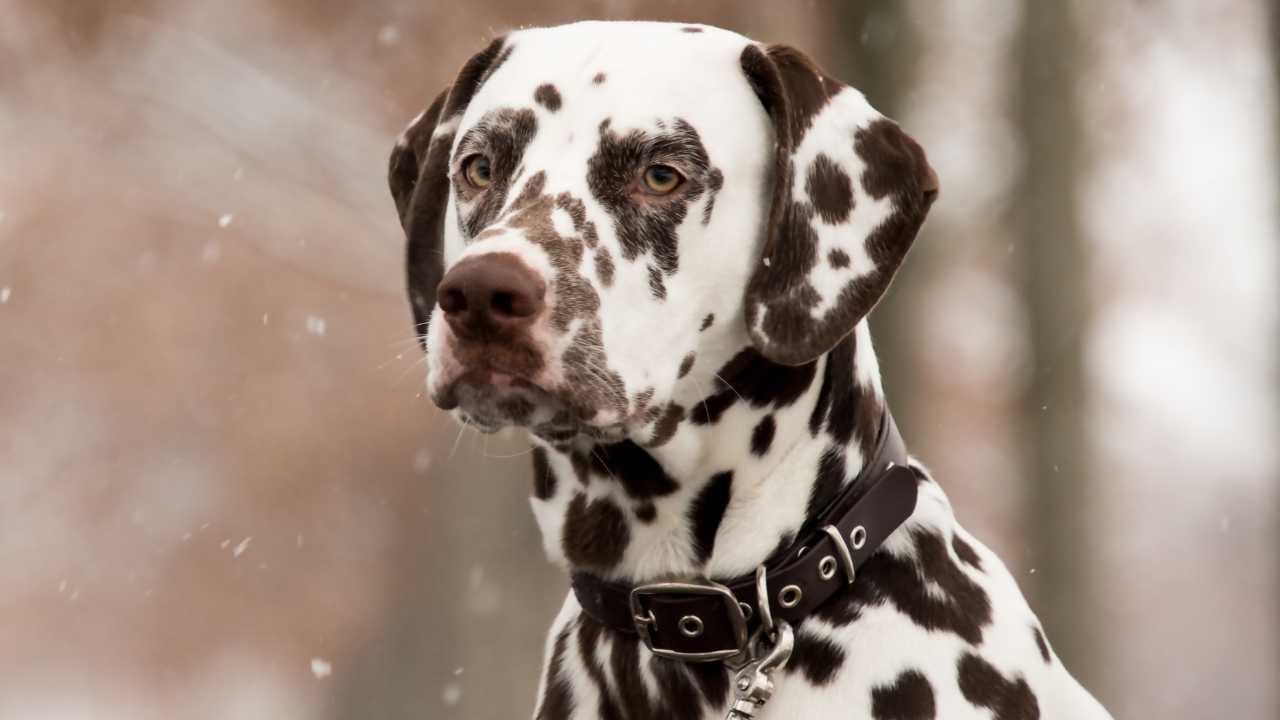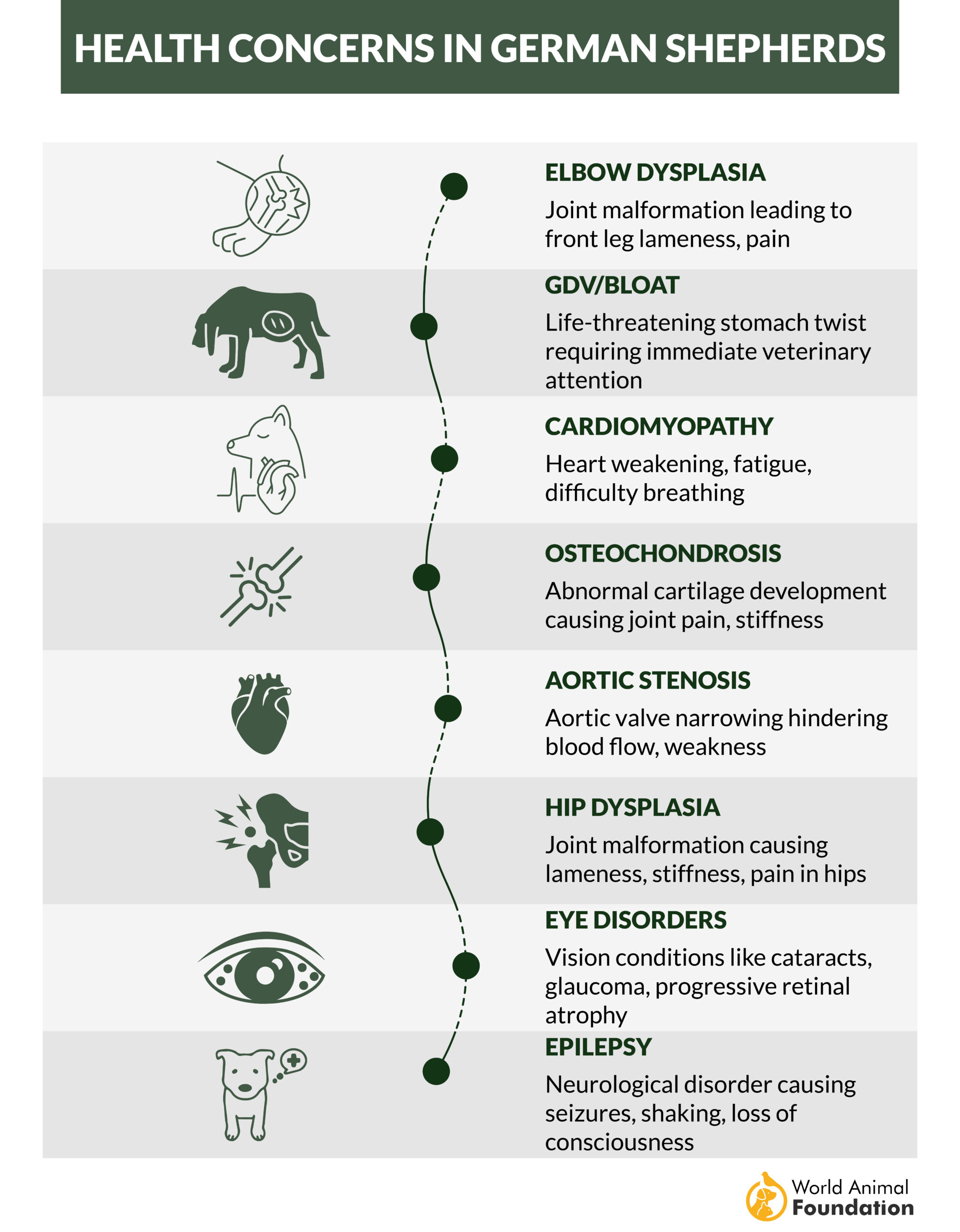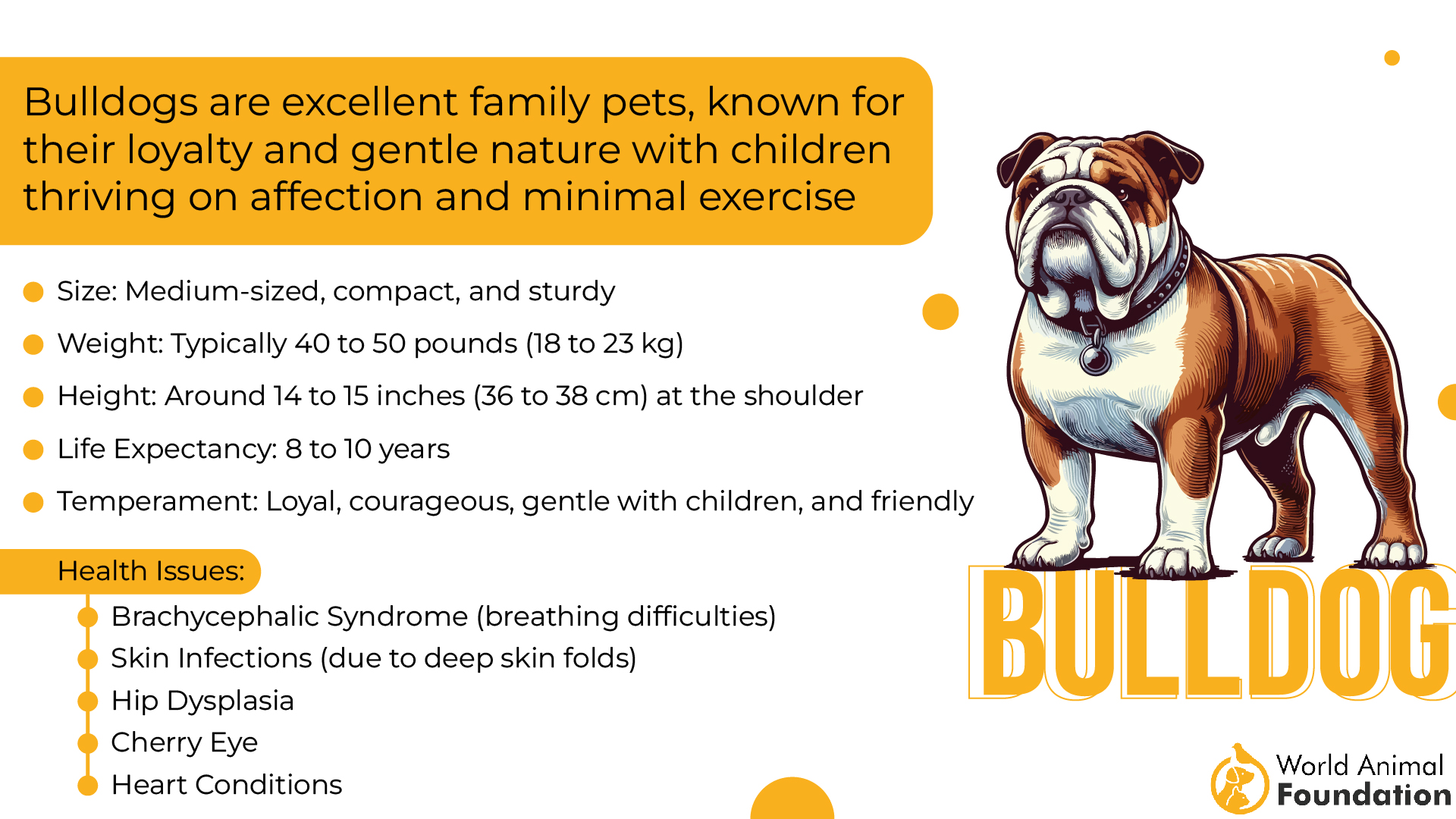In the quest for the perfect canine companion, certain dog breeds have been bred extensively, often prioritizing appearance or specific traits over health and well-being. This has led to a growing concern about the welfare of these overbred breeds, which suffer from a myriad of health challenges and diseases. From breathing difficulties to joint issues, these dogs often endure a lifetime of discomfort. As responsible pet owners and animal lovers, it’s crucial to understand the consequences of overbreeding and advocate for healthier breeding practices. Delve into the stories of the nine most overbred dog breeds and the problems they face in today’s world.
Dogs are often more than just pets—they’re family. But when it comes to certain overbred dog breeds, their popularity can come at a steep price. From the playful Pug to the loyal Akita, these beloved companions can suffer from a wide range of health problems caused by selective breeding practices.
Issues like hip dysplasia, breathing difficulties, and genetic disorders are alarmingly common in these breeds, making it crucial for dog owners to be informed and proactive.
In this article, we’ll uncover the truth behind the most overbred dog breeds, revealing the hidden health risks that often go hand in hand with their cuteness and charm.
Most Overbred Dog Breeds
1. Akita
As per Britannica, the Akita is a majestic and powerful breed, known for its loyalty and courage. Akitas are larger dogs with an imposing presence, and they are often favored by dog owners who seek a noble companion. Unfortunately, due to overbreeding, this breed is prone to a range of health problems that can significantly affect their quality of life. Common issues include hip dysplasia, hypothyroidism, and autoimmune disorders, which are increasingly prevalent in the breed.
The Akita’s size and muscular build also make it more susceptible to joint problems, particularly elbow dysplasia and hip dysplasia. These conditions can lead to chronic pain and mobility issues, often requiring veterinary intervention. Additionally, their genetic diversity has been limited due to selective breeding, which has made them more vulnerable to other serious health conditions like certain cancers.
Despite these health conditions, Akitas are one of the most popular working dogs worldwide, known for their loyalty and protective nature. With proper care, including regular vet visits and early genetic testing, Akitas can live long, fulfilling lives, making them wonderful companions for responsible owners.
Health Conditions
|
Hip Dysplasia |
High |
|
Hypothyroidism |
Moderate |
|
Autoimmune Disorders |
Moderate |
2. Pug
The Pug is a small, charming breed known for its adorable flat face and playful personality. Pugs are among the most popular dog breeds, particularly in urban areas where their compact size makes them ideal for apartment living. However, their distinctive appearance comes at a cost. Pugs are prone to breathing problems, particularly brachycephalic syndrome, which causes them difficulty breathing, especially in hot weather.
Due to selective breeding for their signature wrinkled faces and bulging eyes, Pugs also suffer from various eye problems, including cherry eye, dry eyes, and corneal ulcers. Additionally, overbreeding has made them more susceptible to obesity, which can exacerbate joint problems and skin issues, leading to a shorter, less healthy lifespan. Ear infections are also common, and owners should ensure regular cleaning to prevent complications.
Despite their health problems, Pugs remain beloved for their affectionate temperament and loyalty to their owners. They are often great with children and other pets, making them wonderful family companions. However, potential owners should be aware of the breed’s specific health risks and be prepared to manage them with a proactive approach to care.
Health Conditions
|
Breathing Problems |
Severe |
|
Eye Problems |
Moderate |
|
Obesity |
High |
3. Chihuahua
The Chihuahua is a small dog with a big personality, often regarded as the perfect companion for those seeking a compact pet. They are one of the most popular dog breeds for city dwellers and apartment living, but they come with their own set of health problems. Chihuahuas are prone to dental issues, including tooth loss and gum disease, which are exacerbated by their small mouths.
Due to overbreeding for size and appearance, Chihuahuas are also more likely to develop luxating patellas (dislocated kneecaps), which can cause pain and mobility problems. Additionally, some Chihuahuas are predisposed to heart disease and liver disease, which can be hereditary. The small size of the breed also makes them prone to fractures, so careful handling is essential.
While Chihuahuas are generally healthy with the right care, they are often vulnerable to genetic disorders due to the lack of genetic diversity in the breed. Responsible breeding practices, along with early genetic testing, are essential for ensuring a healthier future for these cute, energetic companions. Despite their health challenges, Chihuahuas remain a favorite among dog lovers due to their feisty and affectionate temperament.
Health Conditions
|
Heart Disease |
Moderate |
|
Dental Problems |
High |
|
Luxating Patella |
Moderate |
4. Dachshund
According to the Hillspet, the Dachshund, often affectionately referred to as the “wiener dog,” is a small breed with a unique body shape characterized by long backs and short legs. This distinct appearance, however, has led to increased risks of health issues, especially spinal conditions like intervertebral disc disease (IVDD). Overbreeding for specific physical traits has made Dachshunds more susceptible to these conditions, sometimes resulting in paralysis if left untreated.
In addition to spinal problems, Dachshunds are prone to obesity, which further strains their delicate backs and joints. Their small size also makes them vulnerable to joint problems like hip dysplasia and elbow dysplasia, conditions that are not only painful but can lead to reduced mobility. Skin conditions and inflammation are also common, particularly in Dachshunds with excess weight.
Despite these health problems, Dachshunds are beloved for their spunky personalities and affectionate nature, often making them excellent family pets. To keep them healthy, owners should ensure they maintain a proper weight, provide regular exercise, and visit the vet for preventive care, particularly for joint problems and spinal health.
Health Conditions
|
Intervertebral Disc Disease |
Severe |
|
Obesity |
High |
|
Joint Problems |
Moderate |
5. Dalmatian
The Dalmatian is a striking breed, well-known for its distinctive black or liver spots. However, this popular dog suffers from several genetic issues due to overbreeding, including deafness. Studies show that around 30% of Dalmatians are born deaf, and the issue is linked to specific genetic traits that are prevalent in the breed. In addition to hearing loss, Dalmatians are also prone to urinary stones, which can cause discomfort and require surgical intervention.
Purina states that the Dalmatian’s high energy levels often lead to health complications if not properly managed. They are prone to developing hip dysplasia, a condition that causes pain and limping. Additionally, Dalmatians are susceptible to skin allergies and eye problems, including cherry eye and other inflammatory conditions. Without proper care and attention, these health challenges can diminish their overall quality of life.
Despite these health problems, Dalmatians remain a popular breed, admired for their energy and intelligence. They make excellent working dogs and family pets, but potential owners should be prepared to handle their specific health needs. With proper breeding practices, including genetic testing and attention to overall health, the Dalmatian can live a healthy, active life.
Health Conditions
|
Deafness |
High |
|
Urinary Stones |
Moderate |
|
Hip Dysplasia |
Moderate |
6. German Shepherd
German Shepherds are revered as one of the most intelligent and versatile working dogs in the world. They are used in a variety of roles, including police and military work, search and rescue, and service dog positions. However, this breed is often plagued by health problems due to selective breeding. German Shepherds are particularly prone to hip dysplasia and elbow dysplasia, which can cause pain, and lameness, and require costly surgeries.
In addition to joint issues, German Shepherds are also susceptible to degenerative myelopathy, a progressive neurological disease that affects their spinal cord and leads to paralysis. The breed’s size and activity level make them more prone to heart disease, particularly as they age. While these dogs are strong, loyal, and energetic, their health problems require early intervention and consistent veterinary care.
Despite these challenges, German Shepherds make excellent companions and working dogs, capable of performing in demanding environments. With early genetic testing and careful management of their health, German Shepherds can enjoy a fulfilling life while being active and loyal members of the family.
Health Conditions
|
Hip Dysplasia |
High |
|
Degenerative Myelopathy |
Severe |
|
Heart Disease |
Moderate |
7. Cavalier King Charles Spaniel
The Cavalier King Charles Spaniel is a small, affectionate dog known for its sweet temperament and elegant appearance. Unfortunately, due to overbreeding, this breed has become prone to several serious health problems, including mitral valve disease (a heart condition) and syringomyelia, a painful neurological disorder. Both of these conditions are highly prevalent in the breed and can significantly affect their quality of life.
Cavalier King Charles Spaniels also suffer from eye problems and are prone to cherry eye, which can lead to painful eye infections and the need for corrective surgery. Due to selective breeding, these dogs have limited genetic diversity, making them more susceptible to various inherited diseases, including liver disease. Without careful breeding practices, these issues can become widespread within the breed.
As per Royal Canin, despite these challenges, the Cavalier King Charles Spaniel remains a favorite among dog owners, thanks to its gentle nature and loving companionship. For those interested in this breed, it’s important to choose a responsible breeder who prioritizes the health and welfare of the dog over appearance. Early genetic testing can help identify potential health risks.
Health Conditions
|
Mitral Valve Disease |
Severe |
|
Syringomyelia |
Severe |
|
Liver Disease |
Moderate |
8. English Bulldog
The English Bulldog is instantly recognizable due to its wrinkled face and stocky, muscular build. However, this breed’s flat-faced structure leads to breathing difficulties and breathing problems such as brachycephalic obstructive airway syndrome (BOAS), which can make it difficult for Bulldogs to breathe, particularly in hot weather or during exercise. This makes them prone to heatstroke, a severe concern for dog owners in warmer climates.
Bulldogs are also prone to hip dysplasia and joint problems, which can limit their mobility and cause chronic pain. Their short legs and heavy body weight put additional strain on their joints, leading to conditions like arthritis as they age. Moreover, Bulldogs are highly susceptible to skin infections due to their many folds and wrinkles, which require regular cleaning to prevent inflammation and irritation.
Despite their health problems, English Bulldogs are incredibly affectionate and make wonderful family pets, especially for families with children. They are typically calm, and loving, and get along well with other animals. However, potential owners should be prepared for the health challenges that come with the breed and ensure that they choose a responsible breeder who is committed to improving the breed’s health conditions.
Health Conditions
|
Breathing Problems |
Severe |
|
Hip Dysplasia |
Moderate |
|
Skin Infections |
High |
9. Yorkshire Terrier
The Yorkshire Terrier or Yorkie is a small dog with a luxurious coat and a bold personality. Despite their small size, Yorkies suffer from several health problems due to overbreeding. Dental issues are very common in Yorkies, as their small mouths often lead to overcrowded teeth and gum disease. Regular dental care is essential for maintaining their health and comfort.
Additionally, Yorkies are prone to luxating patellas (dislocated kneecaps) and liver shunts, a condition that affects blood flow to the liver and can lead to liver disease if not treated early. Their tiny size also makes them prone to fragile bones, increasing the risk of fractures and injuries. Despite their cute appearance, these health problems can be a significant concern for prospective owners, as stated by PetMD.
Although Yorkies are known for their spunky personalities and affectionate nature, it’s crucial to adopt them from breeders who prioritize healthier practices. Proper care, including routine vet checkups and early genetic testing, is necessary to ensure they live long, healthy lives as beloved companions.
Health Conditions
|
Dental Problems |
High |
|
Liver Shunts |
Severe |
|
Luxating Patella |
Moderate |
Conclusion
Many of our beloved dog breeds are plagued by health issues that have resulted from years of overbreeding. Conditions like hip and elbow dysplasia and other genetic disorders are all too common in popular breeds, impacting their quality of life and well-being.
While some dogs may experience fewer health problems than others, the long-term effects of selective breeding practices are undeniable. As dog lovers and responsible pet owners, it’s vital to advocate for breeding practices that prioritize health over appearance.
By supporting breeders who focus on genetic diversity and the overall health of the breed, we can help ensure that future generations of dogs live longer, healthier lives, free from the chronic conditions that overbreeding can cause.
In conclusion, the overbreeding of certain dog breeds highlights significant ethical and health concerns within canine communities. Breeds such as Bulldogs, German Shepherds, and Pugs often suffer from genetic health issues like respiratory problems, joint disorders, and heart diseases due to selective breeding practices aimed at maintaining desired physical traits. These practices not only compromise the well-being of the dogs but also place a financial and emotional strain on owners. Raising awareness about responsible breeding and promoting genetic diversity are essential steps in ensuring healthier, happier lives for these beloved pets and fostering a more sustainable future for all dog breeds.













